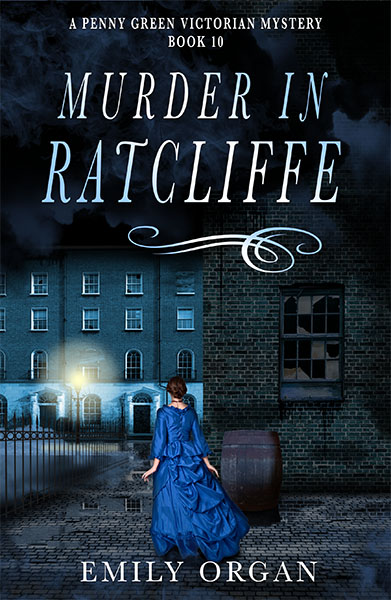
A secret is revealed in the ashes of a fire.
When a house in Penny’s new neighbourhood is gutted by fire, she learns of a connection to an unsolved murder. Always on the lookout for a story, reporter Penny can’t resist investigating.
How did a young, middle-class lady fall from grace? And who killed her? Penny’s search for the truth takes her to London’s East End and a notorious street once known as the Ratcliffe Highway.
Penny’s investigations stir long-buried secrets and she soon makes enemies. Can she rely on her new police inspector husband for help? When a link is uncovered to the aristocracy and the Houses of Parliament, it seems she’s taking on more than she can handle.
Murder in Ratcliffe is book 10 in the Penny Green Victorian Mystery Series. Available as ebook, paperback, audiobook and hardback. Free to read with Kindle Unlimited.
Book 1 – Limelight
Book 2 – The Rookery
Book 3 – The Maid’s Secret
Book 4 – The Inventor
Book 5 – Curse of the Poppy
Book 6 – The Bermondsey Poisoner
Book 7 – An Unwelcome Guest
Book 8 – Death at the Workhouse
Book 9 – The Gang of St Bride’s
Book 10 – Murder in Ratcliffe
Book 11 – The Egyptian Mystery
Book 12 – The Camden Spiritualist
Read an excerpt from Murder in Ratcliffe “Tiger has more scratches on her nose,” I said as I buttered my toast at breakfast. “She’s been in another fight. There are too many cats in Henstridge Place.” “I’m sure she was just telling them who’s boss,” replied James, looking up from his copy of the Morning Express. “I think they’re bullying her because she’s new to the area. Poor Tiger.” “She looks all right to me.” He glanced over at the cat sitting on the hearthrug cleaning her face. “In fact, she seems quite happy.” “I’m worried about her scratches.” “They merely show that she’s been standing her ground in an argument. They’re a good sign.” “Scratches are a good sign?” “Would you rather she simply turned tail and ran away from the other cats?” “Yes, I would. I can’t bear the thought of her getting injured.” “I think it admirable that she’s been standing up to them.” “I’ve seen a rather fat black cat prowling about. I think it belongs to your neighbour, Mrs Harrison.” “Our neighbour.” “Oh yes, our neighbour.” James and I had been married a month, but I still wasn’t fully accustomed to considering his house in St John’s Wood my home. “Mrs Harrison’s cat may look large and intimidating,” said James, “but I think he’s fairly harmless. It’s always the strays that cause the trouble.” “I don’t suppose there’s a great deal we can do about strays.” “Especially when Mr Walpole across the road is determined to feed them.” “Perhaps we should ask him to stop doing so.” “But the strays are rather useful, they keep the rat population down. I once saw a cat with a rat the size of a small dog in its jaws.” “Ugh! Perhaps I should keep Tiger in the house!” “She needs to learn how to handle herself.” James drained his cup of tea. “What do you have planned for today?” “I need to finish my article on the summer hedgerow for The Ladies’ Miscellaneous.” A mirthful expression appeared on James’s face. “Oh, don’t laugh!” I protested. “I wasn’t laughing!” “I can tell when you’re trying not to, you know.” “Really?” “Yes, it’s obvious. Your eyes crease up and your mouth takes on a funny shape.” “You make me sound so very handsome.” “Stop pulling strange faces, then. If you must laugh at me, please don’t try to hide it. My work isn’t quite what it used to be, is it?” “No, it isn’t. But I’m sure something more interesting will come along soon.” “I can’t imagine what. I envy you going out to work, James. Life has changed so much since we got married.” “Should we trade places?” “Yes! Although I’m not sure your colleagues would be particularly happy about that.” “It would certainly make their day a little more interesting.” He wiped his hands on his serviette. “In fact, I think they’d be more than happy to see you turn up in my place.” I glanced up at the clock on the wall. “You’ll be late if you’re not careful.” “Yes, I will.” He got up from his chair and kissed me goodbye. “There’ll be more interesting work for you soon, Penny, and in the meantime you have the book about your father to work on. He can give you a helping hand with it now he’s returned.” James departed then Mrs Oliver the housekeeper bustled into the dining room and began rearranging things on the sideboard. This was her usual routine once James had left for work, so she was accustomed to tidying up at this time. Although I was perfectly entitled to ask her to return when I had finished my breakfast, I always felt it would be an imposition to do so. “Oh, don’t mind me, Madam,” she said once I had drained my tea and got up from my seat. “You take your time.” “Thank you, Mrs Oliver, but I have things to be getting on with.” “Of course.” She smiled and swept away the breakfast dishes as soon as I left the table. I liked Mrs Oliver, even though she seemed a little set in her ways, having been James’s housekeeper for eight years. Her hair was fair, like mine, and she was of a similar build. We weren’t unalike in appearance, in fact, although she was a little older than me and didn’t have to wear spectacles. I grabbed the newspaper and went up to my writing room on the first floor, where my old desk sat beside the window. My view no longer displayed the rooftops of east London, but a suburban, tree-lined street. The houses opposite were large, semi-detached villas covered in cream stucco. James and I lived in a row of smaller terraced houses. Our home was three storeys high but fairly narrow, and the little yard at the back provided just enough space for a small garden. The sweet peas were in flower and I had placed a little vase of them next to my typewriter. With two large bookcases and a cupboard, my room provided plenty of space for my belongings. There was also an easy chair beside the fire that Tiger liked to curl up on. Whenever she was feeling watchful, she would sit on the windowsill and observe the comings and goings of milkmen, delivery boys and coalmen. In the afternoons she watched the nursemaids out with their charges. The street had a regular, orderly routine to it that felt quite different from the constant noise that had surrounded my previous home. I had become accustomed to the sound of trains from the nearby Moorgate station and vehicles rumbling along the road at all hours. Now I could hear the trees rustling in the breeze just outside my window, and the air felt decidedly fresher without the lingering odours from breweries and factories. James and I often took walks in nearby Regent’s Park, then headed up onto Primrose Hill, where we could look out over London to see the distant dome of St Paul’s Cathedral rising above the pointed spires and smoking chimneys. The cranes and wharves of the docks were just visible to the east. But much as I loved to admire this view, it also left me with a twinge of sadness; a sense that I had taken a step back from all the excitement of London town. There was no doubt that the neighbourhood was a pleasant one, but perhaps it was a little too pleasant; not a great deal happened here as a result. It all felt rather quiet, especially when James was out of the house all day. Sometimes work would take up his evenings and weekends. Having worked with him on a number of cases, I accepted this was the demand his profession placed on him. I had anticipated it and bore him no grudge. However, the excitement of working as a news reporter on a daily newspaper was something I missed greatly. I had enjoyed having my mind occupied, but now I found myself worrying about much more trivial matters, such as how my beloved Tiger was getting on with the neighbourhood cats. I tried not to feel too downhearted that my days had become a little dull. Although I loved my husband deeply and was delighted to be his wife, day-to-day married life was much as I had feared it would be. I had received a few commissions from various periodicals but being a lady writer, the subject matter usually pertained to fashion or household matters. Requests for articles on the natural world were also quite common. Although not averse to nature, I struggled to find myself becoming overly enthralled by the subject. I sat at my writing desk and flicked through the Morning Express. As I browsed the reports, I envied my former colleagues who were able to write about important worldly matters, such as the British occupation of Egypt and the death of Victor Hugo. Although it wasn’t long since I had left the paper, I fondly recalled my visits to the British Library’s reading room where I had researched most of my articles. I even missed the short deadlines and the gruffness of my former editor, Mr Sherman. I folded up the newspaper and set it aside. Then I retrieved my notes on the summer hedgerow and rolled a sheet of paper into my typewriter. Tiger strolled into the room, jumped onto the windowsill and began to mew at the birds in the tree. I hadn’t been working for long when a faint acrid smell reached my nose. I wouldn’t have paid it much heed in my previous home, but this wasn’t the usual smell I associated with St John’s Wood. Tiger also noticed it and started sniffing intently at a gap in the window frame. Deeming it offensive to her nose, she jumped down and retreated to her chair. I got up from my seat and peered out of the window. As I did so, the smell intensified and a great cloud of thick grey smoke billowed over the rooftop. Something was alight.
